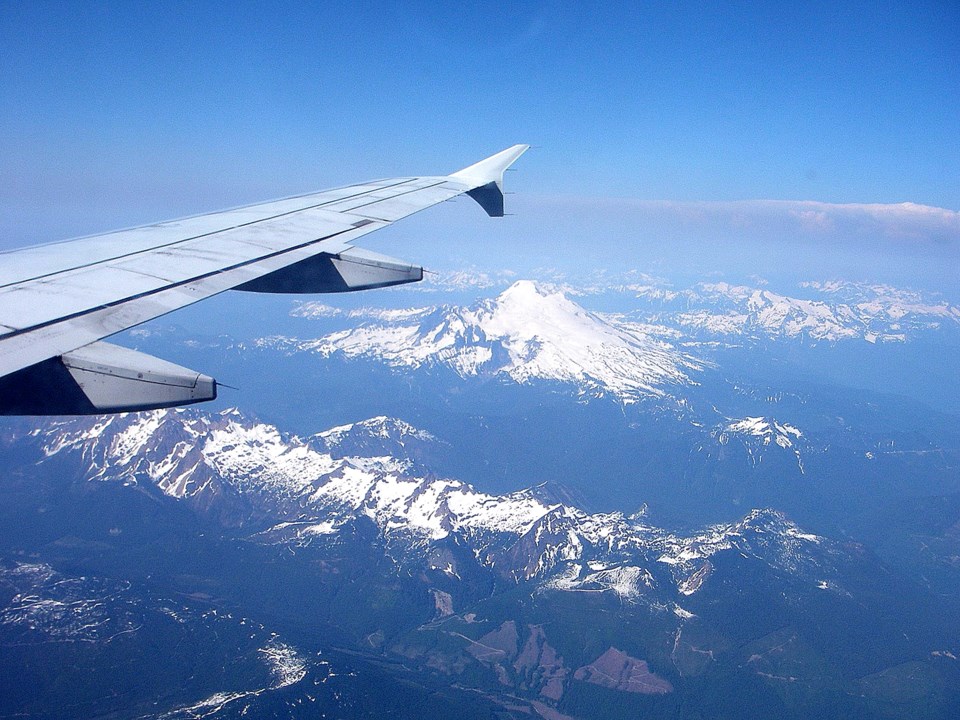I recently had the pleasure of meeting a fellow biologist, Myrta Hayes, who has a degree in Environmental Toxicology and Molecular Biology from SFU. Her passion for protecting our planet led to an eye-opening conversation.
Globally, the aviation industry may contribute as much as 9% towards climate change. Aircraft emit staggering amounts of carbon dioxide (CO2), and for the U.S., currently account for about 11% of its transportation-related CO2 emissions. (The U.S. contributes nearly half of worldwide CO2 emissions from aircraft.)
Aviation is not only a large producer of CO2 but, also, of other greenhouse gases (GHGs), such as methane and ozone.
Airplanes and rockets rely on fuel that typically comprises kerosene or a form or derivative of it. It takes about 10 gallons of oil to produce one gallon of kerosene, meaning airplane fuel is very carbon-intensive (about 85% of kerosene is carbon).
In the upper atmosphere, CO2 and other GHGs produced by airplanes prevent the planet’s long-wave thermal energy from escaping into space, thereby contributing to climate change. Moreover, air travel has been increasing at a rapid rate while regulating airplane pollution has been noticeably absent.
It is both interesting and alarming to see the number of airplanes in the upper atmosphere at any one time, especially for large cities such as Los Angeles.
One reason for the absence of regulation is the lack of viable alternatives. On land, there is the electric car, solar power panels and wind-powered turbines, to mention a few. One can also take a train, bus, bicycle or walk. Air travel does not offer viable alternatives and the technology to produce “clean” energy for airplanes has not seen much development. (NASA is now focusing on new technology but development is slow.)
TRAVEL GREEN
Here’s how you can travel more sustainably (from the David Suzuki Foundation):
• Consider a “staycation.” We live in an extraordinary part of the world with so much to see right here in B.C., so consider being a tourist in your own town/province.
• Choose another mode of transport. Trains and buses, for example, are much more energy efficient than airplanes, and allow passengers an intimate experience of the landscape. For regional trips, these modes can be even faster when airport times are considered.
• Use technology. Video-conferencing for meetings (and webcams for loved ones) are not only good for the pocketbook and the planet, but avoid the stress of travelling and time away from home/family.
• Contact your local federal politicians and tell them you are concerned about aviation’s contribution to climate change. Ask them to take action to regulate and limit GHGs from this sector, and to fund science and technology to improve the development of alternate modes of energy and increased efficiency for aviation.
IF YOU MUST...
And if you have to fly, try to:
• minimize the number of flights by combining trips (e.g., booking more than one meeting in your destination city);
• fly the most direct route possible as take-offs and landings use the most fuel;
• fly during the daytime — studies show that flights taken at night have a greater impact on the climate;
• fly economy because the more people per plane means fewer emissions per person;
• pack light — lighter planes mean less fuel is burned.
As well, you may purchase carbon offsets to account for the flight’s emissions. Offsets that meet “additionality” criteria ensure your purchase results in a net benefit for the climate. If the airline or travel agent does not currently offer the option of offsetting their flights, ask them to consider it.
Melissa Chaun of Port Moody is an ecologist with a passion for all things sustainable. She is events co-ordinator with the Rivershed Society of BC, volunteers on various city committees and co-ordinates the monthly meetings for Tri-City Greendrinks. Her column runs monthly.



